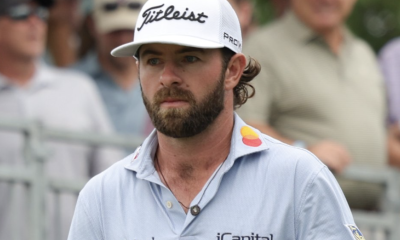Opinion & Analysis
Golfers: Go easy on yourselves!

Heres a fact for you: nearly half of all golfers will never break 100, according to the National Golf Foundation. Less than that will ever break 90, and only five percent will ever break 80. Golf is not an easy game, so you shouldn’t beat yourself up about it. Period.
I’m not here to go all Zen golf on you; I can only speak from personal experience, but the moment you accept that, regardless of your ability to score, you can have a lot of fun, the more you will truly enjoy the game of golf.
When I first learned to play, like many, I was not very good. Everyone I played with was way better than me, and although I don’t remember a lot of those early rounds, I can remember moments of feeling embarrassed for my play. It wasn’t because of the people I was playing with, they were all very helpful and patient, but for some reason, I knew that I was not helping the group. It is those memories that allow me to make sure no matter who I play with now, I make them feel welcome on the course and help them any chance I can.
We all started somewhere, and regardless of how many rounds we have played or how low our handicaps have gotten, we need to be accepting that anyone that takes the time to try and play golf should be afforded the opportunity to learn and enjoy the game.
Even with my current level of play, the insecurities of being a newbie creep in from time to time, I never want to feel like I am the reason my group is being slow—although I must admit that with my normal pace of play that’s not usually an issue. I played a round very earlier in the year during a trip to Florida where I was paired with what I would call very regular golfers, players who generally break 100, but struggle with aspects of their game. Even then, just like when I was 10 years old, I was having a hard time out of a bunker one the second hole and after blading one into the pond on my second attempt (give me a break, it was my first round in four months), I just walked to the green, tended the flag, and told them I’d take my ESC (equitable stroke control) number for the hole. Thas describes my golf game, and I’m OK with that.
Too many golfers get caught up in how the pros play—from the tips, bombing drivers, expecting to make six birdies a round. Players on the PGA Tour are like the aliens from Space Jam (I just seriously dated myself) the Monstars. They have every skill imaginable, and get to do this for a living—you better believe they are going to be good at it. There is NO reason as a 10-15 handicap you should be slamming clubs and stomping your feet for missing a green from 150 yards. It’s just part of the game. Heck, even Rory McIlroy misses greens from time to time. Do you ever hit it like Rory?
Expectations are part of the human ego, and if we don’t manage them properly, we will always feel like we are inadequate. In reality, we should approach every challenge (even something as simple as golf) with the idea that today I have the opportunity to be great, but there is also the equal chance I will fail. We learn from failure, we improve after failure, and it’s not something we should be scared of.
No matter your score, make it fun, enjoy the day, embrace the challenge. Your expectations can make or break what to take from every round of golf you play, and if you think for a second this is the worst golf ever played—trust me it’s not. It’s just one round of many bad rounds played every day, and the next round is your next challenge. Honestly, you’re not as bad as you think you are.
Go easy on yourself. Golf is a lot more enjoyable that way.
Opinion & Analysis
The 2 primary challenges golf equipment companies face

As the editor-in-chief of this website and an observer of the GolfWRX forums and other online golf equipment discourse for over a decade, I’m pretty well attuned to the grunts and grumbles of a significant portion of the golf equipment purchasing spectrum. And before you accuse me of lording above all in some digital ivory tower, I’d like to offer that I worked at golf courses (public and private) for years prior to picking up my pen, so I’m well-versed in the non-degenerate golf equipment consumers out there. I touched (green)grass (retail)!
Complaints about the ills of and related to the OEMs usually follow some version of: Product cycles are too short for real innovation, tour equipment isn’t the same as retail (which is largely not true, by the way), too much is invested in marketing and not enough in R&D, top staffer X hasn’t even put the new driver in play, so it’s obviously not superior to the previous generation, prices are too high, and on and on.
Without digging into the merits of any of these claims, which I believe are mostly red herrings, I’d like to bring into view of our rangefinder what I believe to be the two primary difficulties golf equipment companies face.
One: As Terry Koehler, back when he was the CEO of Ben Hogan, told me at the time of the Ft Worth irons launch, if you can’t regularly hit the golf ball in a coin-sized area in the middle of the face, there’s not a ton that iron technology can do for you. Now, this is less true now with respect to irons than when he said it, and is less and less true by degrees as the clubs get larger (utilities, fairways, hybrids, drivers), but there remains a great deal of golf equipment truth in that statement. Think about it — which is to say, in TL;DR fashion, get lessons from a qualified instructor who will teach you about the fundamentals of repeatable impact and how the golf swing works, not just offer band-aid fixes. If you can’t repeatably deliver the golf club to the golf ball in something resembling the manner it was designed for, how can you expect to be getting the most out of the club — put another way, the maximum value from your investment?
Similarly, game improvement equipment can only improve your game if you game it. In other words, get fit for the clubs you ought to be playing rather than filling the bag with the ones you wish you could hit or used to be able to hit. Of course, don’t do this if you don’t care about performance and just want to hit a forged blade while playing off an 18 handicap. That’s absolutely fine. There were plenty of members in clubs back in the day playing Hogan Apex or Mizuno MP-32 irons who had no business doing so from a ballstriking standpoint, but they enjoyed their look, feel, and complementary qualities to their Gatsby hats and cashmere sweaters. Do what brings you a measure of joy in this maddening game.
Now, the second issue. This is not a plea for non-conforming equipment; rather, it is a statement of fact. USGA/R&A limits on every facet of golf equipment are detrimental to golf equipment manufacturers. Sure, you know this, but do you think about it as it applies to almost every element of equipment? A 500cc driver would be inherently more forgiving than a 460cc, as one with a COR measurement in excess of 0.83. 50-inch shafts. Box grooves. And on and on.
Would fewer regulations be objectively bad for the game? Would this erode its soul? Fortunately, that’s beside the point of this exercise, which is merely to point out the facts. The fact, in this case, is that equipment restrictions and regulations are the slaughterbench of an abundance of innovation in the golf equipment space. Is this for the best? Well, now I’ve asked the question twice and might as well give a partial response, I guess my answer to that would be, “It depends on what type of golf you’re playing and who you’re playing it with.”
For my part, I don’t mind embarrassing myself with vintage blades and persimmons chasing after the quasi-spiritual elevation of a well-struck shot, but that’s just me. Plenty of folks don’t give a damn if their grooves are conforming. Plenty of folks think the folks in Liberty Corner ought to add a prison to the museum for such offences. And those are just a few of the considerations for the amateur game — which doesn’t get inside the gallery ropes of the pro game…
Different strokes in the game of golf, in my humble opinion.
Anyway, I believe equipment company engineers are genuinely trying to build better equipment year over year. The marketing departments are trying to find ways to make this equipment appeal to the broadest segment of the golf market possible. All of this against (1) the backdrop of — at least for now — firm product cycles. And golfers who, with their ~15 average handicap (men), for the most part, are not striping the golf ball like Tiger in his prime and seem to have less and less time year over year to practice and improve. (2) Regulations that massively restrict what they’re able to do…
That’s the landscape as I see it and the real headwinds for golf equipment companies. No doubt, there’s more I haven’t considered, but I think the previous is a better — and better faith — point of departure when formulating any serious commentary on the golf equipment world than some of the more cynical and conspiratorial takes I hear.
Agree? Disagree? Think I’m worthy of an Adam Hadwin-esque security guard tackle? Let me know in the comments.
@golfoncbs The infamous Adam Hadwin tackle ? #golf #fyp #canada #pgatour #adamhadwin ? Ghibli-style nostalgic waltz – MaSssuguMusic
Podcasts
Fore Love of Golf: Introducing a new club concept

Episode #16 brings us Cliff McKinney. Cliff is the founder of Old Charlie Golf Club, a new club, and concept, to be built in the Florida panhandle. The model is quite interesting and aims to make great, private golf more affordable. We hope you enjoy the show!
Opinion & Analysis
On Scottie Scheffler wondering ‘What’s the point of winning?’

Last week, I came across a reel from BBC Sport on Instagram featuring Scottie Scheffler speaking to the media ahead of The Open at Royal Portrush. In it, he shared that he often wonders what the point is of wanting to win tournaments so badly — especially when he knows, deep down, that it doesn’t lead to a truly fulfilling life.
View this post on Instagram
“Is it great to be able to win tournaments and to accomplish the things I have in the game of golf? Yeah, it brings tears to my eyes just to think about it because I’ve literally worked my entire life to be good at this sport,” Scheffler said. “To have that kind of sense of accomplishment, I think, is a pretty cool feeling. To get to live out your dreams is very special, but at the end of the day, I’m not out here to inspire the next generation of golfers. I’m not out here to inspire someone to be the best player in the world, because what’s the point?”
Ironically — or perhaps perfectly — he went on to win the claret jug.
That question — what’s the point of winning? — cuts straight to the heart of the human journey.
As someone who’s spent over two decades in the trenches of professional golf, and in deep study of the mental, emotional, and spiritual dimensions of the game, I see Scottie’s inner conflict as a sign of soul evolution in motion.
I came to golf late. I wasn’t a junior standout or college All-American. At 27, I left a steady corporate job to see if I could be on the PGA Tour starting as a 14-handicap, average-length hitter. Over the years, my journey has been defined less by trophies and more by the relentless effort to navigate the deeply inequitable and gated system of professional golf — an effort that ultimately turned inward and helped me evolve as both a golfer and a person.
One perspective that helped me make sense of this inner dissonance around competition and our culture’s tendency to overvalue winning is the idea of soul evolution.
The University of Virginia’s Division of Perceptual Studies has done extensive research on reincarnation, and Netflix’s Surviving Death (Episode 6) explores the topic, too. Whether you take it literally or metaphorically, the idea that we’re on a long arc of growth — from beginner to sage elder — offers a profound perspective.
If you accept the premise literally, then terms like “young soul” and “old soul” start to hold meaning. However, even if we set the word “soul” aside, it’s easy to see that different levels of life experience produce different worldviews.
Newer souls — or people in earlier stages of their development — may be curious and kind but still lack discernment or depth. There is a naivety, and they don’t yet question as deeply, tending to see things in black and white, partly because certainty feels safer than confronting the unknown.
As we gain more experience, we begin to experiment. We test limits. We chase extreme external goals — sometimes at the expense of health, relationships, or inner peace — still operating from hunger, ambition, and the fragility of the ego.
It’s a necessary stage, but often a turbulent and unfulfilling one.
David Duval fell off the map after reaching World No. 1. Bubba Watson had his own “Is this it?” moment with his caddie, Ted Scott, after winning the Masters.
In Aaron Rodgers: Enigma, reflecting on his 2011 Super Bowl win, Rodgers said:
“Now I’ve accomplished the only thing that I really, really wanted to do in my life. Now what? I was like, ‘Did I aim at the wrong thing? Did I spend too much time thinking about stuff that ultimately doesn’t give you true happiness?’”
Jim Carrey once said, “I think everybody should get rich and famous and do everything they ever dreamed of so they can see that it’s not the answer.”
Eventually, though, something shifts.
We begin to see in shades of gray. Winning, dominating, accumulating—these pursuits lose their shine. The rewards feel more fleeting. Living in a constant state of fight-or-flight makes us feel alive, yes, but not happy and joyful.
Compassion begins to replace ambition. Love, presence, and gratitude become more fulfilling than status, profits, or trophies. We crave balance over burnout. Collaboration over competition. Meaning over metrics.
Interestingly, if we zoom out, we can apply this same model to nations and cultures. Countries, like people, have a collective “soul stage” made up of the individuals within them.
Take the United States, for example. I’d place it as a mid-level soul: highly competitive and deeply driven, but still learning emotional maturity. Still uncomfortable with nuance. Still believing that more is always better. Despite its global wins, the U.S. currently ranks just 23rd in happiness (as of 2025). You might liken it to a gifted teenager—bold, eager, and ambitious, but angsty and still figuring out how to live well and in balance. As much as a parent wants to protect their child, sometimes the child has to make their own mistakes to truly grow.
So when Scottie Scheffler wonders what the point of winning is, I don’t see someone losing strength.
I see someone evolving.
He’s beginning to look beyond the leaderboard. Beyond metrics of success that carry a lower vibration. And yet, in a poetic twist, Scheffler did go on to win The Open. But that only reinforces the point: even at the pinnacle, the question remains. And if more of us in the golf and sports world — and in U.S. culture at large — started asking similar questions, we might discover that the more meaningful trophy isn’t about accumulating or beating others at all costs.
It’s about awakening and evolving to something more than winning could ever promise.




















ChipNRun
Sep 3, 2019 at 11:23 pm
Reasons why people quit:
* Unrealistic expectations.
* Disappearance of “adult time” in USA society. With the prevalence of designer children, everyone wants to supervise their kids 365 a year so that the kids “reach their potential”. Sports travel teams, soccer season blending into little league baseball. Once these ambitious couples have their second child, it’s 20 years before they can play Sunday golf together again.
Ashton
Aug 21, 2019 at 9:55 am
“Do you ever hit it like rory?”
Yea…sometimes he putts like me
John Burns
Aug 18, 2019 at 11:15 pm
I have found that by playing to a “personal par” the game is less stressful and more enjoyable. Keep track of your average score for a few rounds and then try and beat your average by 1-2 shots (you have played well and were under “your par”}. Mark up the scorecard to change the par on holes so it works out to your personal par score. Maybe your par is 88, so you try and make a bogey or better on 16 holes and a par on two easy holes you pick.
It s a great way to measure improvement too. I see too many people shoot the round of their lives like a 77, or 87 or whatever and get mad when they can’t duplicate the best round of the season over and over again.
joro
Aug 18, 2019 at 9:31 am
Very true. The fact that we who once played great have a different game at 80. But as I always say, the memories are still there and we have to realize they are only memories. We are lucky to be able to play.
TTidey
Aug 17, 2019 at 7:36 pm
Well said Ryan!! I was just pouting over a bad round, one week before my club championship. Isin’t there an automatic invite to Augusta if you win your CC? 🙂
David Harris
Aug 17, 2019 at 5:55 pm
Why don’t we make the hole bigger-from 4 inches to 8 inches-for amateurs
Ed in NM
Aug 17, 2019 at 5:14 pm
Your stats put things in perspective including that only 5% of golfers will ever break 80. I wonder if the false expectations of many amateur golfers who think they should be playing like the pros is a big reason why some people quit the game in frustration.
Dennis Rubery
Aug 17, 2019 at 3:05 pm
Over the years i have lost alot of good guys who have passed away and golf was there life.
Now i apreciate im here to play the game im grateful …
Bogeyman
Aug 17, 2019 at 12:49 pm
Totally agree. I tell new golfers that no one cares how well you play – only how quickly you play. Be ready to play your shot and be still and quiet when others are shooting and you will never lack for playing partners.
Dennis Rubery
Aug 17, 2019 at 3:04 pm
Over the years i have lost alot of good guys who have passed away and golf was there life.
Now i apreciate im here to play the game im grateful …
Bill
Sep 3, 2019 at 1:49 pm
great point, Bogieman.
I’ve played with people that throw clubs, cuss and scream at their shots and basically make it uncomfortable for everyone they play with (usually only play with them once, if possible). Being able to laugh at your mistakes and keep them in perspective is the only way you can enjoy this game long term.
It’s a hard game. The hardest, actually. You never master it, you only have varying degrees of success. Because of this, it’s also the best character builder of all the sports.
The ego is a funny thing, but this is true for all. We ALL have a talent ceiling. Accepting that helps you keep the bad rounds and shots in perspective as well as the great shots and rounds. That’s when you fall in love with the game. We can raise that ceiling a bit with lessons and practice, but everyone has a ceiling. Be grateful for the days you get a glimpse above your normal ceiling and have a beer or family to enjoy when you shoot average or less.
Kelly fitzgerald
Aug 17, 2019 at 11:51 am
Totally agree. I am trying not to be too hard on myself. Used to average a 79 or 80 now at 59 I average around 85. Just need to realize I can’t play like I used to. Golf should be fun not stressful. I’m trying real hard!
Acemandrake
Aug 17, 2019 at 10:56 am
Play once in a while without keeping score. It will reduce the anxiety of playing with expectations.
You’ll want to do it more often.
Tom Duckworth
Aug 17, 2019 at 10:29 am
When I watch golf on TV its interesting to me to see how the top twenty change from week to week. It just highlights to me how up and down their game can be.
bosshog919
Aug 16, 2019 at 1:06 pm
Usually playing with better players often motivates some to put in the work and get better as well. At least that’s how it worked out for me. Most ONLY see the results of a lot of practice and time on the course and think it will just come….well that’s DEFINITELY not the case for most. Although, if/when I am on the course my expectations are always to play well, but I have to keep in mind that if I’m only playing twice a month, those expectations have to be adjusted and just enjoy the time out on the course.
Distance Compression Dude
Aug 16, 2019 at 12:30 pm
If more golfers invested on some lessons and applied what they learned, they might just break 100 (maybe even 90 and 80).
The problem is that a lot of “golfers” think that they can just pick up a set of clubs and expect to play well. That’s not how it works.
If you’re a hack, then keep hacking away. However, if you wish to play better, see your local PGA Pro and practice.
trwaggo
Aug 16, 2019 at 11:52 am
Watching PGA Tour Live has made me a much more patient and happy golfer. When you just watch on the weekends you’re seeing the best players in the world with the their A games – because they’re leading.
Watching a guy on Thursday shoot 75 is pretty informative. The number of times I’ve watched pros miss the green from inside 125 yards is too high for me to count, the number of 3 putts and duffed chips and balls left in the bunker…pros are aliens but even they have bad days and/or bad stretches and they certainly hit bad shots.
Im still hard on myself – but it’s in a much more positive way than it used to be.
Bill
Aug 17, 2019 at 9:44 am
This guy gets it. I don’t have PGA live now, but at one point I did. Only watching the leaders on the weekend creates a false reality. Those golfers leading are playing at their very best on the weekend, which is hardly their reality 100% of the time. It’s important to be able to see those 75 score rounds and all of the frankly bad shots out on tour. Most recently I recall Henrik Stenson’s glorious shank. That was good to see and certainly softened up my expectations.
GotThaRight
Aug 17, 2019 at 3:24 pm
I noticed that too when watching The Masters on their website. They had it where you could see almost every shot. And yes those guys are really good though even they arent the robots that are shown come sat and sun afternoon. What CBS and NBC show us during that coverage is the best of the best at their very best.
3rd times a charm
Aug 17, 2019 at 3:28 pm
I think what seperates the pros from very good/elite amateurs is that pros quickly get over a bad shot and only focus on what they can do next. Not what has already happened.
chris pottle
Aug 16, 2019 at 11:31 am
Everyone was much better than I or I was – not me
Tom
Aug 19, 2019 at 8:34 am
Love it when someone tries to play grammar police and it turns out they’re wrong.
“Everyone was much better than me” is grammatically correct. Easy way to test? Substitute in the third person:
“Everyone was much better than him”, not “Everyone was much better than he”.
“Everyone was much better than Chris”.
“Everyone was much better than you”.